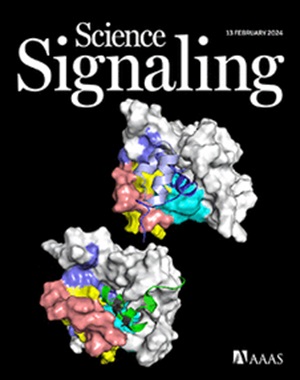eIF2 激酶 GCN2 和 p53 信号之间的协调支持嘌呤代谢和前列腺癌的进展。
IF 6.6
1区 生物学
Q1 BIOCHEMISTRY & MOLECULAR BIOLOGY
引用次数: 0
摘要
癌症会通过各种途径减轻外部和内部压力,以继续生长和进展。我们以前曾报道过,eIF2 激酶 GCN2 和综合应激反应在前列腺癌(PCa)中具有组成性活性,是维持氨基酸平衡所必需的,而氨基酸平衡是肿瘤生长的动力。然而,虽然 GCN2 功能的缺失会降低细胞内氨基酸的可用性和 PCa 的生长,但并不会造成明显的细胞死亡。在这里,我们发现 PCa 中 GCN2 的缺失会诱导前增殖 p53 信号转导。这种 p53 信号的激活是通过 GCN2 抑制依赖性嘌呤核苷酸的减少发生的,嘌呤核苷酸的减少会损害核糖体的生物发生,从而诱导核糖体生物发生检查点受损。在 PCa 细胞系、器官组织和异种移植模型中,GCN2 的缺失加上 p53 的缺失或药物抑制嘌呤的从头生物合成会减少细胞增殖并增加细胞死亡。我们的研究结果突显了在营养应激过程中 GCN2 和 p53 调节之间的协调相互作用,并为如何针对它们开发新的 PCa 治疗策略提供了启示。本文章由计算机程序翻译,如有差异,请以英文原文为准。
Coordination between the eIF2 kinase GCN2 and p53 signaling supports purine metabolism and the progression of prostate cancer
Cancers invoke various pathways to mitigate external and internal stresses to continue their growth and progression. We previously reported that the eIF2 kinase GCN2 and the integrated stress response are constitutively active in prostate cancer (PCa) and are required to maintain amino acid homeostasis needed to fuel tumor growth. However, although loss of GCN2 function reduces intracellular amino acid availability and PCa growth, there is no appreciable cell death. Here, we discovered that the loss of GCN2 in PCa induces prosenescent p53 signaling. This p53 activation occurred through GCN2 inhibition–dependent reductions in purine nucleotides that impaired ribosome biogenesis and, consequently, induced the impaired ribosome biogenesis checkpoint. p53 signaling induced cell cycle arrest and senescence that promoted the survival of GCN2-deficient PCa cells. Depletion of GCN2 combined with loss of p53 or pharmacological inhibition of de novo purine biosynthesis reduced proliferation and enhanced cell death in PCa cell lines, organoids, and xenograft models. Our findings highlight the coordinated interplay between GCN2 and p53 regulation during nutrient stress and provide insight into how they could be targeted in developing new therapeutic strategies for PCa.
求助全文
通过发布文献求助,成功后即可免费获取论文全文。
去求助
来源期刊

Science Signaling
BIOCHEMISTRY & MOLECULAR BIOLOGY-CELL BIOLOGY
CiteScore
9.50
自引率
0.00%
发文量
148
审稿时长
3-8 weeks
期刊介绍:
"Science Signaling" is a reputable, peer-reviewed journal dedicated to the exploration of cell communication mechanisms, offering a comprehensive view of the intricate processes that govern cellular regulation. This journal, published weekly online by the American Association for the Advancement of Science (AAAS), is a go-to resource for the latest research in cell signaling and its various facets.
The journal's scope encompasses a broad range of topics, including the study of signaling networks, synthetic biology, systems biology, and the application of these findings in drug discovery. It also delves into the computational and modeling aspects of regulatory pathways, providing insights into how cells communicate and respond to their environment.
In addition to publishing full-length articles that report on groundbreaking research, "Science Signaling" also features reviews that synthesize current knowledge in the field, focus articles that highlight specific areas of interest, and editor-written highlights that draw attention to particularly significant studies. This mix of content ensures that the journal serves as a valuable resource for both researchers and professionals looking to stay abreast of the latest advancements in cell communication science.
 求助内容:
求助内容: 应助结果提醒方式:
应助结果提醒方式:


